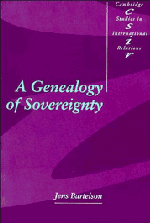Book contents
- Frontmatter
- Contents
- Preface
- 1 Introduction: sovereignty and fire
- 2 The problem: deconstructing sovereignty
- 3 Beyond subject and structure: towards a genealogy of sovereignty
- 4 Inventing outsides: proto-sovereignty, exempla and the general theory of the state in the Renaissance
- 5 How policy became foreign: sovereignty, mathesis and interest in the Classical Age
- 6 Reorganizing reality: sovereignty, modernity and the international
- 7 Conclusion: the end of sovereignty?
- Notes
- Bibliography
- Index
- CAMBRIDGE STUDIES IN INTERNATIONAL RELATIONS
1 - Introduction: sovereignty and fire
Published online by Cambridge University Press: 03 May 2011
- Frontmatter
- Contents
- Preface
- 1 Introduction: sovereignty and fire
- 2 The problem: deconstructing sovereignty
- 3 Beyond subject and structure: towards a genealogy of sovereignty
- 4 Inventing outsides: proto-sovereignty, exempla and the general theory of the state in the Renaissance
- 5 How policy became foreign: sovereignty, mathesis and interest in the Classical Age
- 6 Reorganizing reality: sovereignty, modernity and the international
- 7 Conclusion: the end of sovereignty?
- Notes
- Bibliography
- Index
- CAMBRIDGE STUDIES IN INTERNATIONAL RELATIONS
Summary
What is sovereignty? If there are questions political science ought to be able to answer, this is certainly one. Yet modern political science often testifies to its own inability when it tries to come to terms with the concept and reality of sovereignty; it is as if we cannot do to our contemporaneity what Bodin, Hobbes and Rousseau did to theirs.
Thus posed, the question of sovereignty can be brushed aside as irrelevant to modern political science. One could argue that the discipline has outgrown the need to wrestle with general concepts, and should devote itself exclusively to their concrete instantiations in empirical reality. Today, when empirical reality furnishes us with a great many sovereignty struggles, we should step down from the ivory tower and concentrate on less abstract problems, perhaps to the benefit of their very concrete victims.
Still, the general question of sovereignty is likely to enter through the back door. With some simplification, one could say that the question of sovereignty is to political science what the question of substance is to philosophy; a question tacitly implied in the very practice of questioning. However much we want to get down to earth, few would deny that modern political reality has the state as one of its constituent parts, however intangible and porous it seems at closer inspection, whether this closer inspection purports to deal with questions about ‘autonomy’, ‘integration’, ‘democracy’, or ‘justice’.
- Type
- Chapter
- Information
- A Genealogy of Sovereignty , pp. 1 - 11Publisher: Cambridge University PressPrint publication year: 1995
- 1
- Cited by



